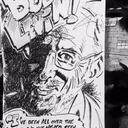Stay in the Loop
BSR publishes on a weekly schedule, with an email newsletter every Wednesday and Thursday morning. There’s no paywall, and subscribing is always free.
The turning point at Brandeis U.: How I became a writer, circa 1960
How I became a writer: a 1960 memoir (Part 1)

Brandeis accepted me on a Thursday in April, 1960. Friday, it dropped football. I had two varsity letters from Friends Central.
I should have read the sign. I was leaving Philadelphia, a land that valued touchdowns and jump shots, for a preserve where the only score that brought respect was your G.P.A.— "a place," said Don Nussbaum, a disgruntled power forward from Rockville Center, "run by the first ones out in dodgeball."
I should add that everyone at Brandeis in 1960, was as unhappy as Don Nussbaum. The athletes were unhappy because most of the student body classified them on an intellectual plain with elm trees. The party people were unhappy because the school's idea for a for a blowout weekend headliner was Odetta. The political activists were unhappy because of unfair play for Cuba and the bomb. The scholars were unhappy because the library closed at 11 and they only had exams twice a semester. And the artists were unhappy because their art demanded that they be unhappy.
A rumored romance
Based on a free-choice writing sample, freshmen were exempted from English comp or assigned a section. The sample was to determine if we could organize simple, declarative sentences into coherent paragraphs, only no one had told me. My lyric essay about a West Philadelphia pool hall won me a slot with Mrs. Medvedev.
She was a green-eyed redhead, with a tattoo on her wrist from Auschwitz. She was married to Yankel Medvedev, chairman of the Near Eastern and Judaic Studies Department. According to worldly sophomores in my dorm, she was having an affair with an untenured abstract expressionist from Fine Arts. She was also, when it came to grades, "Brutal." After our first assignment"“ describing how to tie one's shoes"“ she flailed us like Xerxes at the Hellespont.
Someone I admired
The second assignment was to describe a character we admired. That, let me tell you, set competitive juices flowing. Irwin Selzman was doing Paul Tillich. (I had never heard of him.) Victor Goldblatt had Reinhold Niebuhr. (I had never heard of him.) Celia Peltz chose Eleanor Roosevelt. (OK! One for three.)
I picked Garnet "Sugar" Hart, a Strawberry Mansion welterweight boxer, who had earned my fascination by spicing his training regimens with emcee gigs in Ridge Avenue bars.
I sat beside Rick Feldman, an aspiring Beatnik from Darien. (He had chosen Jean-Paul Sartre.) "These papers are not bad," Mrs. Medvedev said. "They are abominably bad."
My eyes were on my desert boots. I would have settled for a C, easy. "But one of you shows promise."
I saw a familiar paper clip.
"That's mine," I said.
"That might be yours," Rick Feldman said.
""'He was tall and thin and could hit with either hand,'" Mrs. Medvedev said.â—†
To read the next installment, click here.
I should have read the sign. I was leaving Philadelphia, a land that valued touchdowns and jump shots, for a preserve where the only score that brought respect was your G.P.A.— "a place," said Don Nussbaum, a disgruntled power forward from Rockville Center, "run by the first ones out in dodgeball."
I should add that everyone at Brandeis in 1960, was as unhappy as Don Nussbaum. The athletes were unhappy because most of the student body classified them on an intellectual plain with elm trees. The party people were unhappy because the school's idea for a for a blowout weekend headliner was Odetta. The political activists were unhappy because of unfair play for Cuba and the bomb. The scholars were unhappy because the library closed at 11 and they only had exams twice a semester. And the artists were unhappy because their art demanded that they be unhappy.
A rumored romance
Based on a free-choice writing sample, freshmen were exempted from English comp or assigned a section. The sample was to determine if we could organize simple, declarative sentences into coherent paragraphs, only no one had told me. My lyric essay about a West Philadelphia pool hall won me a slot with Mrs. Medvedev.
She was a green-eyed redhead, with a tattoo on her wrist from Auschwitz. She was married to Yankel Medvedev, chairman of the Near Eastern and Judaic Studies Department. According to worldly sophomores in my dorm, she was having an affair with an untenured abstract expressionist from Fine Arts. She was also, when it came to grades, "Brutal." After our first assignment"“ describing how to tie one's shoes"“ she flailed us like Xerxes at the Hellespont.
Someone I admired
The second assignment was to describe a character we admired. That, let me tell you, set competitive juices flowing. Irwin Selzman was doing Paul Tillich. (I had never heard of him.) Victor Goldblatt had Reinhold Niebuhr. (I had never heard of him.) Celia Peltz chose Eleanor Roosevelt. (OK! One for three.)
I picked Garnet "Sugar" Hart, a Strawberry Mansion welterweight boxer, who had earned my fascination by spicing his training regimens with emcee gigs in Ridge Avenue bars.
I sat beside Rick Feldman, an aspiring Beatnik from Darien. (He had chosen Jean-Paul Sartre.) "These papers are not bad," Mrs. Medvedev said. "They are abominably bad."
My eyes were on my desert boots. I would have settled for a C, easy. "But one of you shows promise."
I saw a familiar paper clip.
"That's mine," I said.
"That might be yours," Rick Feldman said.
""'He was tall and thin and could hit with either hand,'" Mrs. Medvedev said.â—†
To read the next installment, click here.
Sign up for our newsletter
All of the week's new articles, all in one place. Sign up for the free weekly BSR newsletters, and don't miss a conversation.

 Bob Levin
Bob Levin